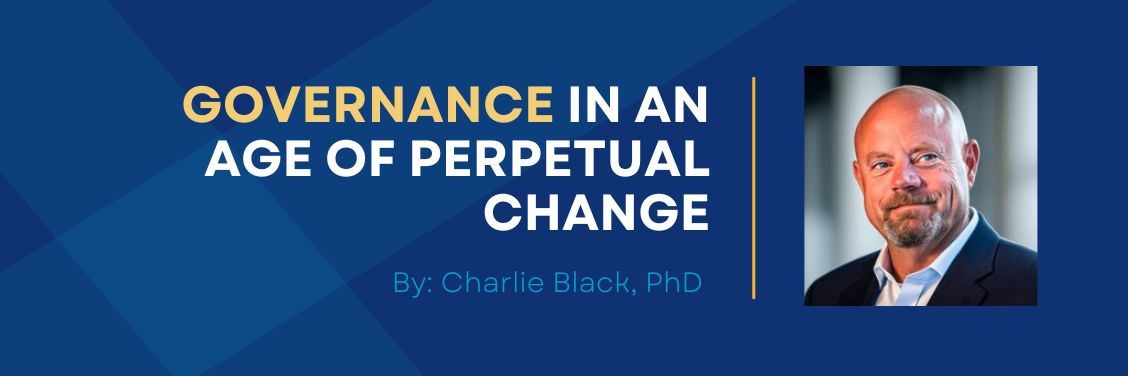
Our world is experiencing the acceleration of systemic changes with unprecedented consequences to our capacity to make sense, know, and exert control over nature and one another.1 In January 2000, the late Stephen Hawking- who is regarded by many as one of the most impactful theoretical physicists of all time- stated that the “next century will be the century of complexity.”2 Today, we live in a hyper-connected world with unprecedented access to knowledge that fuels the perpetual creation of new technology, boundless choices, and unlimited possibilities. This change in dynamic directly affects boards of directors.
Businesses thrive or die in this fast-paced environment that demands perpetual sense making and adaptation. Incessant change brings new political, economic, and social conditions from international to local levels that contribute to disruptions and evolution across industries and reshape customer expectations. For boards, and directors as individuals, the only thing that is certain is uncertainty itself, which necessitates a relook at approaches to governance that can keep pace with changes.
Velocity of Change
Everyone feels what sometimes seems like a breath-taking pace of life. Everyone, every sector, every job seems to be increasingly and forever busy. Everything is faster. We must accept this reality while also retaining the ability to slow down and make sense of it all. For too long many have ignored or missed the signals of change that are often not captured with traditional business metrics we hold solemn to explain the state of our company or the market.
For example, the stock market shows us useful investor trends while quarterly reports explain earnings, yet they both reflect past behaviors and do not predict the future. Increasingly, tomorrow will look much different than yesterday. What does this mean? For one, many of the methodologies we use have us look in the rearview mirror to make judgments and, ultimately, decisions about the road ahead. These traditional and time proven approaches work in stable and unchanging conditions, which is now history. The truth is there is not a new normal, but rather a time of perpetual change with effects that cross industry, domain, and geography. The impacts from systemic change are substantively reshaping the very markets into which companies were born. Now, to thrive in the very same market demands adaptation and innovation to keep pace with accelerating change.
Limits of Control
Today, more than ever, good governance demands introspection and reflection. Directors must purposefully look at the larger context to see the forest and not just a single tree. Directors must ask a range of questions to uncover the why behind the metrics. Governance is not just about ensuring things are done right but also about doing the right things. Doing the wrong thing well is still wrong and is not in the interests of shareholders or owners.
Naively, we lead ourselves to believe we can understand and control more than is possible. Intuition and deep experience can be displaced and fooled. A recent PwC study suggests boards of directors are “overconfident in their ability to see or predict crisis.”3 We simply overestimate our own capacity to predict even the very near future. The depth and breadth of the complex system in which we find ourselves is unknowable, yet we must provide effective governance despite perpetual change.
To be clear, the sky is not falling, but there is unprecedented change to the broader society in which we live and work. Fortuitously the risk and opportunity emergent from change can be discovered with improved self and organizational awareness. We must surface and question new as well as long-standing assumptions about our industry, the market, and society more generally. Our experiences over time that serve to build a successful career also create individual and collective blinders that shadows risk and makes it unseen – until it is. How we see ourselves, the world and ourselves in that world greatly influences our judgments and decisions in performance of board duties.
The pandemic reshaped expectations and opened our eyes to the possibility of highly improbable events described by NYT bestselling author Nassim Taleb as black swans.4 No longer can we expect the continuance of historically predictable markets, reliable supply chains, cost and access to capital, or a stable work force. The reasonable expectations for routine and predictability were shattered in the past several years. This is not a new phenomenon, though the pandemic brought our reality into focus. It is important to acknowledge that there is no returning to what existed before. It is gone and we must create a new tomorrow. As directors, we must continually reimagine our expectations about our particular industry, our company, and the future of both.
The famous and late American futurist Alvin Toffler foretold that “the illiterate of the 21st century will not be those who cannot read and write, but those who cannot learn, unlearn, and relearn”. It is a time to purposefully reflect – to think about our past thinking and actions and chart a new course for governance. We must learn to accept uncertainty and embrace emergence, which means recognizing we can’t predict the future. Crisis will come more often. To that end, we must unlearn rigid and linear thinking methodologies that seek to remove, ignore, or discount uncertainty and emergence. We must relearn that humans and human society are resilient by nature and so, too, can our company with the right leadership focus.
Directors must themselves constantly seek self-awareness to remove cognitive blinders that might hide the signals of forthcoming change or bias preferences that avoid essential but tougher questions. Governance in times of change requires enhanced awareness about human and technological changes and cascading effects to market demands, government regulation, and a wide host of issues.
I am reminded of Michael Porter’s assertion in On Competition, that competition is “one of society's more powerful forces for making things better.”5 Moreover, Dennis Cagan rightfully argues in his book The Board of Directors for a Private Enterprise, that boards of directors provide “the chance to tap into years of experience and get answers to transform your business.”6 Governance can make things better for the company, shareholders, stakeholders, and customers. To that end, directors and executives alike will benefit from more dedicated reflective and imaginative thinking. Famously, Albert Einstein similarly asserted that imagination is more important than knowledge itself.7 I suggest we can change by design or be changed by circumstance. As directors we have an inherent responsibility to manage risk and prevent crisis, both of which occur during times of change.
Key Take Aways for Directors – (and executive teams)
- Look beyond the boundaries of your industry and company.
- Re-calibrate the timescale and metrics to make judgments.
- Explicitly state assumptions that underpin your industry and strategy.
- Think in possibilities rather than computing probabilities.
- Evaluate strategy execution but also the efficacy of the strategy itself given change.
- Compose boards of directors that are quick learners and can synthesize diverse high velocity information.
- Consider the risks from geo-politics and democratization of advanced technology.
- Dedicate to purposeful learning, relearning, and unlearning.
1 Alvin Toffler, Future Shock (New York: Random House, 1970), 20-22.
2 Stephen Hawking’s response to a question following his remarks at the White House Millennial Council. Jan 23, 2000. Accessed Dec 3, 2022. https://clintonwhitehouse4.archives.gov/Initiatives/Millennium/shawking.html
3 Pwc Pulse Survey. https://www.pwc.com/us/en/library/pulse-survey.html
4 Nassim Taleb. The Black Swan: The Impact of the Highly Improbable. (New York: Random House, 2007), 3-4.
5 Michael Porter. On Competition. (Cambridge, Harvard Business School Publishing, 2008), xi.
6 Dennis Cagan. The Boards of Directors for a Private Enterprise. (Bloomington, IN: AuthorHouse, 2017), 2.
7 Albert Einstein. Cosmic Religion and Aphorisms (Mineola, New York, Dover Publications: 1931), 97.

ABOUT CHARLIE BLACK, PHD
Charlie Black, PhD is Co-Founder and Managing Partner of Xundis Global, LLC a bespoke consultancy that partners with both private and public entities to successfully navigate complexity and change. He has over 35 years leading organizations from across industry and domains in times of turbulence and crisis. He currently serves on the board of advisors for two privately held companies. He has co-authored a book and numerous peer reviewed publications on social complexity, leadership, and culture and routinely delivers keynote speeches on the same.
Disclaimer: The views and opinions expressed in this blog are solely those of the authors providing them and do not necessarily reflect the views or positions of the Private Directors Association, its members, affiliates, or employees.
